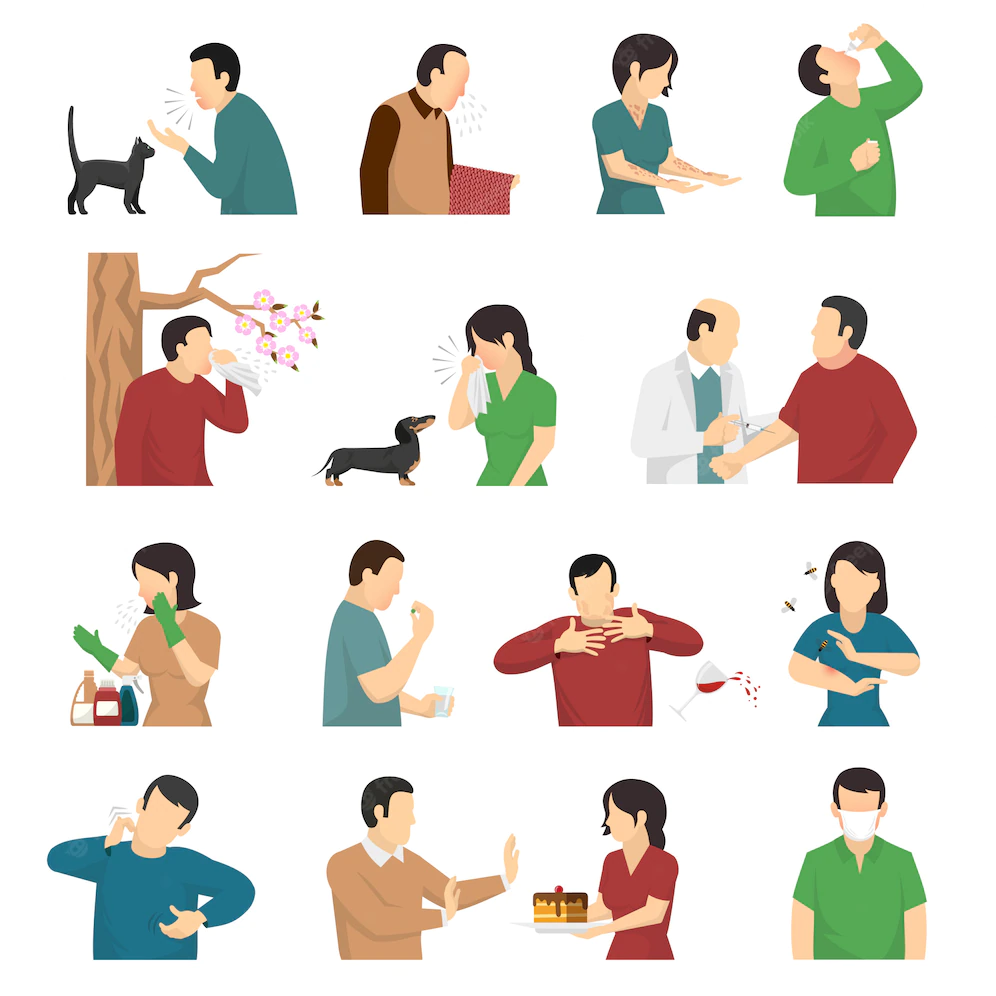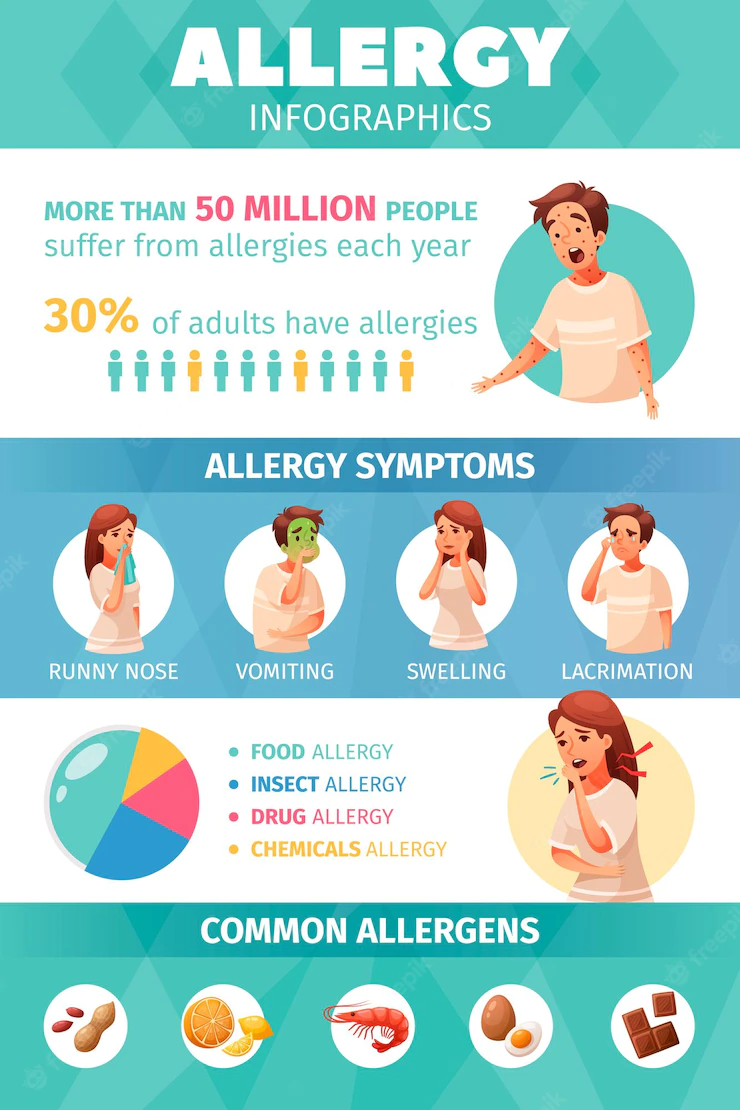Exposure to mold (at work, at home, or outdoors) causes the immune system to overreact in persons who have a mold allergy. Mold allergies can result in coughing, itching eyes, and other unpleasant symptoms. Mold allergy is associated with asthma in certain persons and exposure results in restricted breathing and other airway problems.
Whooping cough, hay fever, seasonal allergies. These are a few potentially life-threatening and debilitating conditions resulting from allergic reactions to specific allergens. To be aware and protect yourself as best you can, there are many steps you can take to ensure your health.

Food Allergies
Major food allergies can be categorized in 2 groups:
Primary food allergies
They are caused by hypersensitivity to specific proteins and are usually detected when they are very young. They are life-threatening, with a death rate of between 0.3% and 5%
Secondary food allergies
They are caused by exposure to foods at a particular stage in their development before they have had the chance to develop an immunity to them; therefore, they cause symptoms later on. These readings between 0.1% and 1%
Dust Mites
Dust mites are tiny, microscopic organisms that are present in our environment. They are invisible to the naked eye and can be found under beds, mattresses, carpets, and around the house in large numbers. They thrive in warm, humid environments; however, the most affected areas are those with a lot of traffic, such as between floorboards or next to heating or air conditioning ducts. When dust is disturbed (e.g., disturbed by a child throwing a toy or sneezing), they will release their mites or a substance that they produce, which can cause allergic reactions in people with sensitive immune systems.
Pets
Pet allergens can cause allergic reactions, including dogs, cats, and insects. The most common allergens are proteins present in the dander (tiny debris) of pets, such as the dander from dogs and cats, as well as house dust mites and pollen. They can also cause irritation, asthma, and eczema. With up to 30% of all people suffering from allergies, it is crucial to be aware of any potential triggers such as pet allergens to avoid severe and potentially life-threatening health problems.
Plants
Plants are a common cause of allergic reactions. Exposure to pollen can be a significant trigger for those who suffer from hay fever. Plants such as ragweed, tree, grass, and weed pollens are common allergens released in the air. If you’re allergic to pollen, your immune system will react to pollen as if it were a harmful substance and release histamines and other chemicals into the bloodstream. This can cause symptoms like runny nose, itching eyes, coughs, and sore throats.
Indoor Allergens
Indoor allergens are a contributing factor to many allergic reactions. Dust mites, pet dander, and mold spores are the main indoor allergens. These allergens can quickly be brought into the home on clothing, carpet, and furniture, which is why it is essential to keep allergen levels in the home low by regularly cleaning, airing rooms out every day, and not keeping pets or allowing pets on upholstered furniture.
Allergic Rhinitis
Allergic rhinitis is an allergic reaction to indoor allergens, pollen, and animal dander. It is common in people who suffer from hay fever or perennial allergic rhinitis. The chest and throat become inflamed, leading to the production of thick mucus and causing severe breathing problems or difficulty sleeping.
Asthma
Allergic reactions can trigger asthma attacks in susceptible people, leading to life-threatening asthma attacks being triggered at any time of the day or night. Allergic reactions can cause asthma symptoms such as shortness of breath, wheezing, and a tight feeling in the chest. The most common triggers of allergic reactions are pollen and animal dander.
Allergy Shots
Allergy shots help alleviate the symptoms of many potentially life-threatening allergies by decreasing exposure to a specific allergen. This means less histamine is released into the bloodstream, decreasing allergy symptoms and allowing for better overall health. The allergens are diluted with a small amount of saline solution injected into the skin. There are two types of allergy shots – subcutaneous (under the skin) and intradermal (just under the skin). The smaller the dose, the higher chances of side effects such as redness, tenderness, or even pain.
Immunotherapy
Immunotherapy is often used to treat asthma or eczema. The allergens are injected into the body over time to build immunity. The injections gradually increase dosage and frequency until the desired effect is achieved. This treatment is not recommended for severe allergies or asthma as they may suffer from adverse reactions such as shock, loss of consciousness, or even death.
Common Allergens
The most common allergens include pollen, dust mites, pets, and food items. The most common allergen that causes allergic reactions is pollen. Familiar sources of pollen include trees, grass, and weed pollen. Other common allergens are dust mites and pet dander.
There are several ways to avoid or control allergic reactions:
Avoiding allergenic substances as much as possible is the best first step in eliminating symptoms associated with allergies. An allergist can recommend what products to avoid and, if these are unavoidable, how to keep the allergens contained by methods such as keeping them in sealed containers or avoiding touching them with bare hands.
How to Treat Allergies?

Treatment for allergies can involve the person being exposed to the allergen (such as having a spray applied to their skin or medicine taken), tablets, and following a balanced diet. Most people suffering from allergies require a combination of treatments to find the best available treatment. Generally, allergies tend to occur in children, adults, and seniors; however, they are more common in young children than in older ones.
There are three types of allergy treatments: medicated, non-medicated, and herbal remedies.
Medicated allergy treatment
This can include tablets, liquid medicines, and injections. Most people with allergies will require a combination of treatments and medications to find the best treatment for their specific symptoms.
Nonmedicated remedies
They include lifestyle changes, such as eating a diet of fresh fruits and vegetables, avoiding allergens, and exercising regularly.
Herbal remedies
They are also available and may help reduce allergic symptoms and reduce the risk of developing severe health problems. Common remedies include Cayenne pepper, eucalyptus oil, and licorice root. Speak to your doctor to determine which is best for you.
Conclusion
Allergies are a serious health condition, so it is essential to control and get rid of them as quickly as possible. Investing time and money to find the proper treatment can mean the difference between livable symptoms and a life-threatening allergy. Following recommended treatment plans can help you avoid the symptoms associated with allergies and lead to a healthier, more enjoyable lifestyle.


